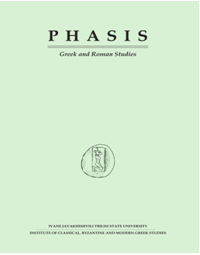Damaskios’ triadische Theorie des Einen im Hinblick auf ihre Divergenz gegenüber Iamblichos’ und Proklos’ Prinzipientheorien
Damascius' Triadic Theory of the One Regarding Its Divergence from Iamblichus' and Proclus' Theories of Principles
DOI:
https://doi.org/10.60131/phasis.25.2022.7009Abstract
The metaphysical model developed by Plotinus, the founder of Neoplatonism, is determined by the following three principles: the One, Nous, and Soul. Later, Neoplatonists tried to differentially explain the inner constitution of all three principles without abandoning the fundamental Plotinian tripartite structure. As a result, the telescoped metaphysical model characteristic of early Neoplatonism unfolded in late Neoplatonism. The primordial hypostases of Plotinus became three different spheres of reality, which go through the necessary inner evolution (in a supertemporal sense) and accordingly contain new principles or evolutionary stages. It was also the case with the One. The present paper aims to investigate the triadic constitution of the sphere of the One in Damascius, considered as the last Neoplatonist. This could be of interest in both contexts, i.e., the ancient Neoplatonic and the Christian. On the one hand, the question about the nature and orientation of the late Neoplatonic doctrine of principles requires particular attention, especially given that compared to the Proclean doctrine, Damascius’ doctrine receives less attention. On the other hand, Damascius’ theory of the undivided triadic unity of the three principles making up the sphere of the One, namely the One-all (ἓν πάντα), the All-one (πάντα ἕν), and the United (ἡνωμένον), reveals some interesting similarities to the Christian Trinitarian doctrine. In an argument with Iamblichus and Proclus, Damascius rejects the beyondness of the One to the triad of Limit (= Monas, Father/Existence), Unlimited (= Indefinite Dyad, Power), and Mixed (= Triad, Nous), identifies the One with the first triadic member, and repeatedly emphasizes the absence of number and division in the highest realm of reality. For him, the three members of the triad represent the three undivided moments of the original causal activity of the One in itself.
Downloads
Published
Issue
Section
License
Copyright (c) 2022 PHASIS

This work is licensed under a Creative Commons Attribution-NonCommercial 4.0 International License.


